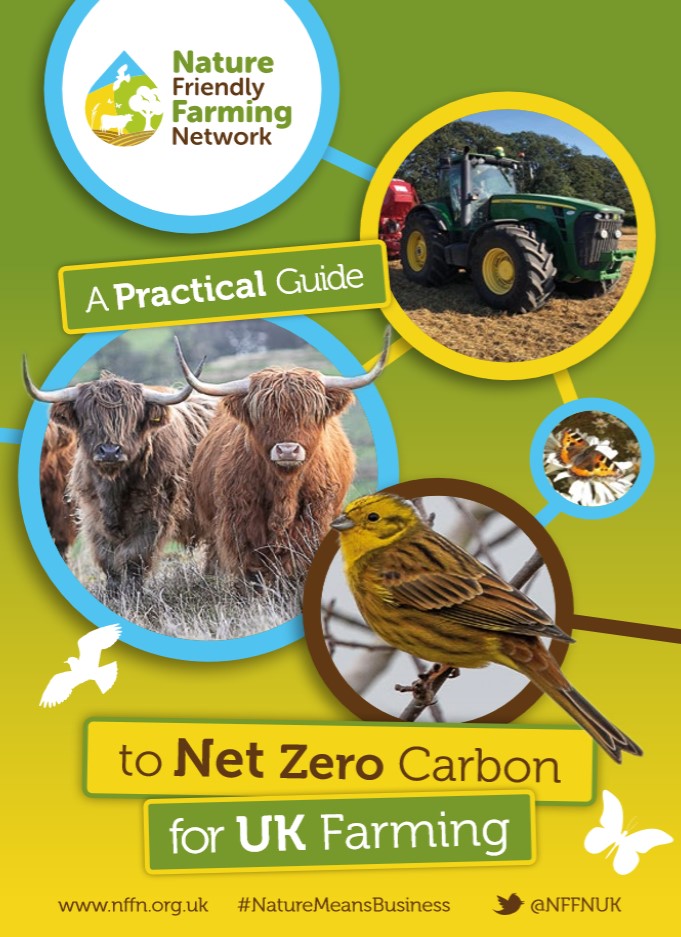
Practical ways to achieve Net Zero
Hosted by the Nature Friendly Farming Network.
This session will share advice from farming experts and those with first-hand experience of reducing carbon emissions. Participants will hear from experts from the farming, NGO and academic communities, including some pioneering farmers who are already making significant headway to Net Zero on their farms. NFFN have created a guide to help achieve Net Zero which will be shared with attendees.
‘Net Zero’ refers to the overall balance between emissions produced and emissions taken out of the atmosphere. Achieving Net Zero is required to meet the Paris Agreement, which aims to keep global temperatures below a 1.5°C rise above pre-industrial levels. According to the International Panel on Climate Change (IPCC), we have less than 12 years to contain global warming within the 1.5°C target. To achieve the scale of change needed, action must be taken now to reduce emissions and lay the foundations for the longer-term transformation required. Following expert advice from the Climate Change Committee (CCC), the UK Government has committed to a legally binding net-zero carbon target for 2050. The NFU has recently set out an ambition to achieve Net Zero from agriculture by 2040 (in England & Wales).
Achieving Net Zero will require all sectors to act urgently, and the UK farming and land use sector, which currently contributes 10% of overall greenhouse gases, can make a significant contribution. Recent research by Green Alliance suggests that by cutting emissions from agriculture, restoring ecosystems, planting trees and protecting soils, emissions from UK land use could be reduced by 60% by 2030.
There is no silver bullet. A range of measures are required to achieve Net Zero from UK agriculture and land use, and the most effective actions will vary depending on farm type and geography. Attendees will leave the session with a clear understanding of Net Zero and some practical action they can take now to contribute to the target.
Speakers/hosts:
Helen Chesshire is lead farming advocate at the Woodland Trust, responsible for working with both the farming sector and policy makers to promote the benefits of trees on farms. Otherwise known as agroforestry, the deliberate integration of trees within agricultural crops and livestock is a win–win for sustainable food production and the natural environment. The Woodland Trust can provide advice and support to farmers interested in agroforestry. Helen grew up on a dairy and sheep farm in the Midlands.
Chris Clark, with his wife Fiona, owns and manages Nethergill Farm. They are currently building a 180 ha eco-hill farm business with a sustainable added-value meat activity, an educational and field study facility and eco-tourism holiday lets (www.nethergill.co.uk). He is a partner in Nethergill Associates, a business management consultancy currently assisting with the conjecturing and management of future farming uncertainties nationally. A former farm tenant and farm manager, he now has thirty years of business management experience, many within the agriculture and allied food industry, of which over thirty years were managing his own businesses. Nethergill Associates has expertise in financial management, marketing and farm business planning. Chris is also a member of the Yorkshire Dales National Park Authority and the North Yorkshire Rural Commission.
David Lord manages the farming side of his business on the North-East Essex coast, farming approx. 750ha of mixed soils but predominantly heavy London Clay. His farming system revolves around soil conservation and regeneration using cover cropping, diverse rotations and direct drilling to reduce inputs and improve biodiversity on the land he farms. His farm is also in HLS, and neighbours SSSI salt marsh owned by Essex Wildlife Trust, so he sees a lot of interesting bird life and a variety of habitats on the farm. David is a strong supporter of independent science and farmer-led decision making. He is currently chairman of Colchester branch NFU, and a steering group member for the AHDBs Eastern strategic farm.
Martin is a farmer and contractor in South Cambridgeshire, growing mainly arable crops on his family farm and rented land. He has a special interest in farm conservation management, currently running an ELS and HLS agreement and has Countryside Stewardship schemes on land he rents and manages. He also supports the delivery of Stewardship schemes for a number of other farmers. Martin is the UK Chair of the Nature Friendly Farming Network.
